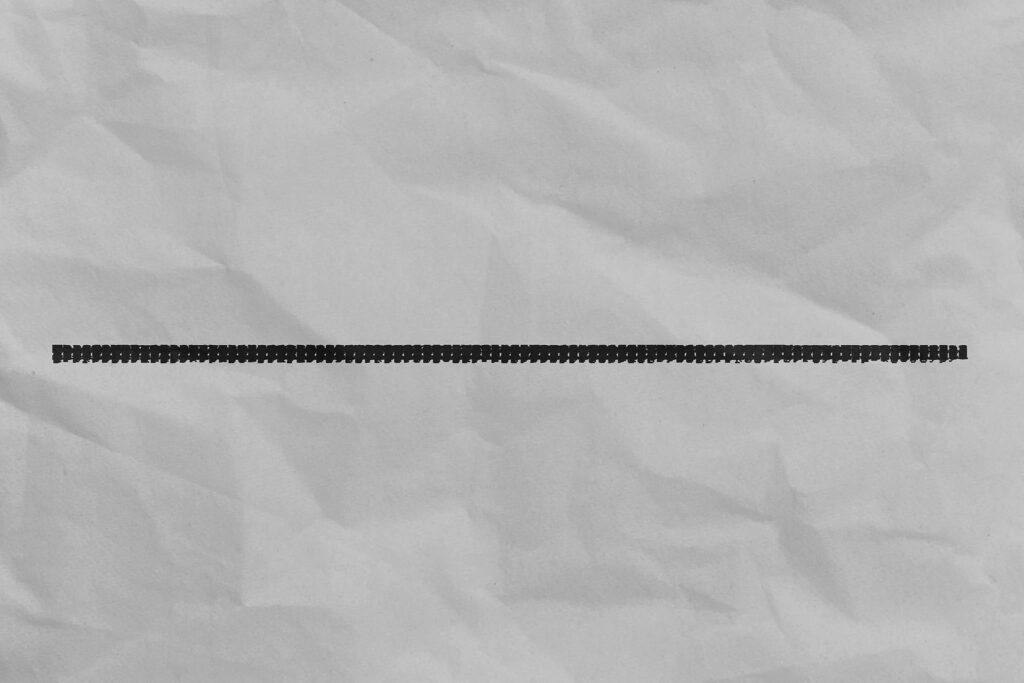by Ryul Song
208 questions by 36 participants from 12 national pavilions at the Venice Architecture Biennale 2021 printed line by line on top of each other on a single piece of paper.
2021년 베니스 건축 비엔날레 참가국 중 12개 국가관의 36명 참가자의 208개 질문 모두를 하나하나 겹쳐 인쇄한 작업이다.

12ish Questions in the Post-Architectural World
by Ryul Song and Christian Schweitzer
What influence does architecture have today (honestly)? How can we define architecture (in the context of a built environment that is generated today in the almost complete absence of architects … maybe not in the western world but seen globally)? What distinguishes architecture from building? If a building isn’t automatically architecture, is the reversal also true: architecture isn’t automatically a building? Does architecture have to be self-conscious in order to qualify as architecture? Does architecture require a moral code (that goes beyond building-law), and how can such a code be enforced?
Does architecture have any relevance in the answer to the question “How will we live together”? Is architecture a result of political-, economic-, and social systems, or does it exist independent of those? Is architecture a result or a cause?
If housing is a human right what are the implications for architecture? Is architecture a philosophical, sociological, or cultural concept? Is architecture exchangeable? Do you know the meaning of concepts like de-growth, de-globalization, commons, ecofeminism, complementaries, and if not how can architects claim to contribute anything to the solution of our problems?
There are 1.5 times more chicken bred by humans than humans on this planet, why does this fact have no influence on architecture? Should the demolition of any existing building be declared a crime? What influence does time have on architecture (other than the usual distinction of ‘before’ and ‘after’ completion)? Even if it sounds contradictory, is the issue of durability still relevant in architecture considering that ‘the temporary’ is the prevailing condition of existence in our world today? Does technology change our understanding of space, or isn’t it rather philosophy, which only later results in the development of technology? Is futurism as bad as traditionalism, as both distract from the ‘now’?
Is the individual’s need to be valued higher than the collective’s need when designing our built environment (in other words: how much are we willing to compromise towards the society as a whole)? Can architecture (in itself) change a human life? Can contentment be measured and quantified in architecture? Is architecture a result or a canvas? Can architecture be objective, and if yes, why should it be?
Is change inevitable, and if so can architecture ever provide a ‘solution’? Can we teach architecture, or do we actually always teach architecture history (considering that the next generation always counters the previous one)? Is architecture a result or a way of thinking and/or of acting? Can architecture be right or wrong, or just appropriate or inappropriate, or just be or not be? Can architecture emerge over time just by changing the rhetoric around it (and what does that mean for designing architecture)? Why do things have to be as they are, and if not why do they have to be different?
What relevance can a manifesto have today? Does it make more sense to run an architecture office or a community kitchen? Can architecture help us to cope with- and to navigate the burden of life? Can architecture help us to negotiate space, to give us a place in this world (and wouldn’t that imply that architecture actually just is a subgenre of furniture design)? Is architecture a result or shouldn’t it provide opportunity? When we know something is fundamentally wrong, should we keep silent out of respect for the feelings of the other, or to maintain societal peace, or to prevent that speaking up would devour our influence to evoke change? Is provocation a legitimate means to evoke change? Are you happy, and if not, why not (and does architecture play any role in the answer, positive or negative)?
Seoul November 10, 2020
PS: And what we actually want to know is: why is doing architecture so hard, so painful, so disappointing, a constant fight against the world? Can we change the process to make it easier, or do we have to change its definition? Or are we doing architecture fundamentally wrong against our own instincts of self-preservation and personal health? Do we expect too much, do we have to dumb down, or compromise against our better knowledge? Or maybe our knowledge is wrong in the first place?